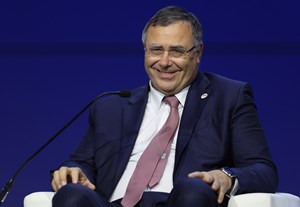TotalEnergies CEO calls on policymakers to “face reality” as world oil demand rises
(Bloomberg) – The world could still be using more than 100 MMbpd of oil by 2040, making it vital to start preparing and adapting for a warmer climate, said TotalEnergies SE Chief Executive Officer Patrick Pouyanne.

The warning from the outspoken 60-year-old Frenchman carries some weight, as under his leadership, TotalEnergies is investing $5 billion a year into low-carbon fuels and renewables, while remaining a major supplier of oil and gas. The fact is that “it will take time” to build a clean global energy system that can satisfy the demands of a growing population, Pouyanne said.
“The responsibility for political leaders is to work seriously now on adaptation” to higher temperatures, the CEO said in an interview at TotalEnergies’ headquarters near Paris on Wednesday. “It doesn’t mean that you should give up” on the Paris climate targets, but policymakers must face reality, he said.
World oil consumption rose above 100 MMbpd in 2023 and is expected to keep rising this year and next, according to the International Energy Agency.
Achieving net zero emissions by 2050 requires tripling renewable energy capacity by the end of the decade and more than doubling green investments to $4.5 trillion a year globally by the early 2030s, the IEA said last year.
“Maybe it’s achievable,” Pouyanne said, but it requires global coordination. Europe’s current policies aren’t supportive of the efforts of companies such as TotalEnergies, which has been criticized by governments, investors and climate groups even as it’s directing a third of its annual capital expenditure into clean power and low-carbon fuels such as biogas, Pouyanne said.
While the French company’s $5 billion annual investment in clean energy dwarfs that of its U.S. peers, European investors still “see the glass half empty” and have been selling some of their holdings in oil companies, Pouyanne said.
Europe’s regulators are putting pressure on financial institutions “to go quicker than society” in the shift to net zero, making the region’s banks reluctant to finance fossil fuel projects for fear of getting caught on the wrong side of sustainability rules and climate litigation, Pouyanne said. However, U.S. lenders are happy to pick up the baton, he said.
TotalEnergies, which is marking the 100th anniversary of its founding this year, needs to keep producing both oil and gas and clean energy for many years to come, Pouyanne said.
The company must continue to grow its oil and gas production with new projects in places such as the U.S., Qatar, Iraq, Brazil and Uganda. Strong earnings and dividend payments from fossil fuels are needed to keep investors happy and fund the growth of clean power until that business can become cash-flow positive in 2028, Pouyanne said.
TotalEnergies sees power, renewables and synthetic fuels accounting for 20% of total energy sales by 2030, up from 8% last year. This can be achieved without large and expensive acquisitions, Pouyanne said. Even so, the company’s strong balance sheet puts it in a perfect position to buy parts of projects from wind and solar farm developers that are currently grappling with big increases in financing costs, he said.


